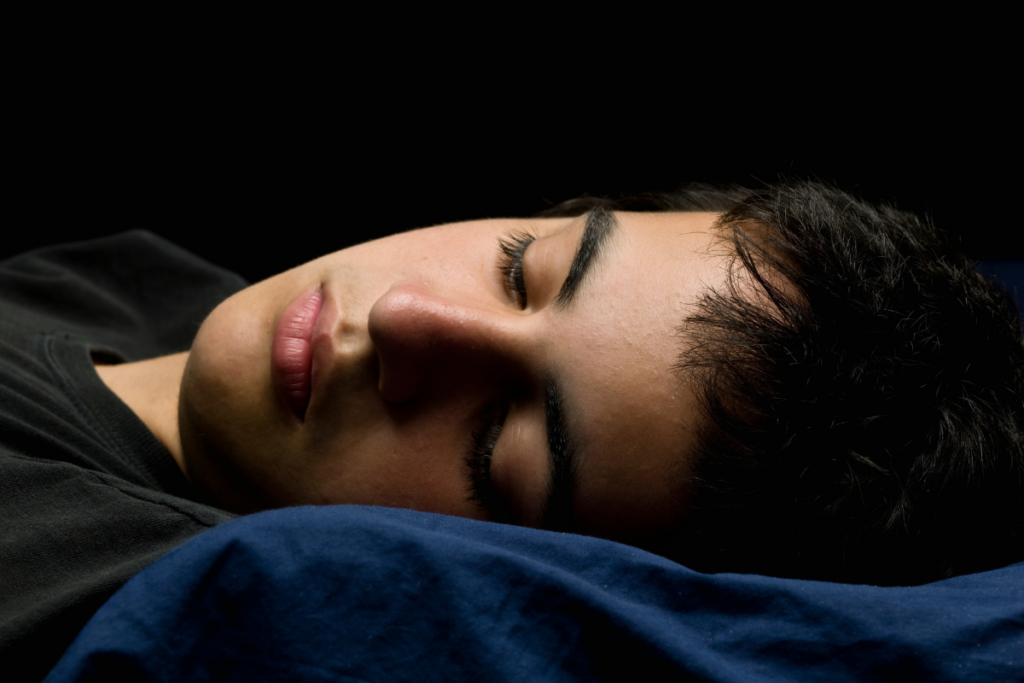
Problems with sleep are very common with ME as many people don't have the usual body signals that help them get off to sleep and stay asleep. If this is you, you'll need to help give your brain plenty of signs that say "It's time for sleep now." Doctors call this sleep hygiene.
Firstly, the only thing you should do in your bed is sleep – so no homework or watching tablets.
If you can, make your whole bedroom (or part, at least) just for sleeping. This could mean working in another room, or putting away work and screens, including your phone.
It's also important to try not to sleep in other rooms. So the overall effect should be that when you go into your bedroom, your brain gets lots of strong signals saying "It's time for sleep now".
It also helps to have a regular routine before going to bed. This will give your brain more signals to go to sleep.
So, you might find that a warm bath relaxes you, and a warm drink might help you get off to sleep (milk seems to be helpful if you can take it). Some people also find lavender oil helps them relax - use small amounts until you know your body can tolerate it.
Try to avoid things that stimulate your brain, such as TV, games (online or otherwise), internet and texting for at least an hour before going to bed. Some books are stimulating and can also wake you up. Gentle music or audio books can be helpful instead.
Whatever you do, try and do the same thing every evening so the brain learns that this routine is associated with sleeping.
It is also important to avoid anything with caffeine in the afternoon and evening. Caffeine is in coffee, tea, soft drinks such as coca cola, energy drinks such as Red Bull, and in chocolate.
Lying in your bed tossing and turning would only teach your brain that bed is a place not to sleep, so if you can't get to sleep within 30 minutes, get up. Then go out of the bedroom, and try your wind-down routine again; or go and make yourself a warm drink.
Keep avoiding anything that will stimulate your brain to stay awake, including screen time.
Research suggests that the more we sleep, the poorer quality sleep we actually have. For refreshing sleep, we need plenty of rapid eye movement (REM) sleep.
If you sleep for too many hours, you will actually have less REM sleep, so sleeping more can actually make things worse. Aim for between 9 and 11 hours a night, depending on your age, and on what time your friends go to bed and get up (those who have good habits!).
Initially you may feel worse, but after a couple of weeks most people start to feel better.
Day/night reversal is common in young people with ME and won't help you improve, so try and avoid it if you can. It is important that your brain gets all the right signals to tell it when it is day and when it's night.
Research has shown that many people who are not exposed to daylight during the day have difficulties sleeping at night, so try and stay awake during the day as much as you can, so that you see plenty of daylight.
If you do suffer from day/night reversal, then treat it like jet lag. Wake up 30 to 60 minutes earlier each day until you are waking up between 7am and 8am. Initially, you will probably feel worse because you will be having less sleep, but after a couple of weeks you should be sleeping better at night.
You also need to keep your bedtime consistent, so your body gets used to switching off at the same time. For anyone with complete day/night reversal, ask for advice from your doctor.
There are different types of rest which people find helpful. Most rest doesn't involve sleeping, and can include sitting quietly or "zoning out," possibly listening to music. This should not be in your bedroom if possible.
If you really need a sleep, make sure that it is less than 40 minutes and before 3pm, otherwise your sleep at night might be disrupted.
Below are some links to relaxation exercises and ideas which may be helpful, and fun to do. There are also apps such as Calm and Headspace, which have a cost but also have some free tasters. There are loads to choose from on Youtube so it also may be a matter of finding the one you enjoy.